人教版八上英语6单元第一课时教学设计
人教版八年级英语上册第六单元说课教案

新目标英语八年级上册第六单元教学案例Unit 6 I’m more outgoing than my sister.Section A教材分析教学内容为“Go for it ”新目标英语八年级上册第六单元Section A1a-3c..学习内容主要体现在以下3点:1、学习有关人物特点的单词:tall; fat; thin; short; heavy; calm;wild; long hair; short hair; outgoing; quiet; funny; serious;smart; athletic; beautiful; ect.2、学习人物比较的重要句型:(1)Pedro is funnier than Paul.(2)Tina is taller than Tara.(3)Tom is more athletic than Sam.3、掌握语法点:the comparative and superlative degrees ofadjectives 形容词的比较级和最高级学生分析1、利用多媒体课件上英语课;学生视听感受明显;表现出极大兴趣;在欣赏和享受中学习;学习效果很明显..2、学生以前已经学过有关人物特点的单词;但不会将其变形;用于人物或事物的比较中..通过对本课的学习可以巩固所学知识;掌握用正确的语言结构表达人物特点和人物比较..教学目标本课以素质教育为目的;结合教材重点、难点及英语学科特点;利用多媒体辅助教学;从视、听、说等方面使学生得到锻炼;在愉快、轻松的氛围中温故而知新;达到初步运用英语交际的能力..1、谈论学生感兴趣的话题以及播放学生熟悉的人物图片;指导学生学习有关人物特点的单词、人物比较的表达及语法知识点“形容词的比较级和最高级”..2、通过学习本课;增强师生、生生间的相互了解和沟通..3、培养学生的口头表达能力、理解能力和提高学生听力水平..教学设计本节课的教学内容一共有五个部分:lead-in; words study; listening and speaking; comparison degree learning; homework.Step 1 Lead-in10minutes1.把全班学生分为四个小组;看哪个小组能说出最多的关于人物外貌或性格的形容词..teacher: Which group can tell me the adjective words形容词about appearance 外貌 and personalities 性格 as many as possible2.展示一些名人或有趣的相片;并和学生谈论他们的人物特点..1、复习已学内容;自然延伸到新课学习;起到承上启下的作用..2、开展竞赛活动;既可调动课堂气氛;又可提高学生求知欲望;一举两得..Step 2 words study5minutes在学生已掌握部分人物特点形容词的情况下;增加新的单词;扩充学生词汇量..Step 3 Listening and speaking15minutesI. Listening1、Listen to the tape and number the pictures in 1b.2、Listen to the tape and complete the chat in 2a. Listen againand fill in chat in 2b.3、Check the answers.听力训练既是对知识的巩固;也为下一步的任务输出提供了输入材料..II. speakingOne student describe one of classmates’characteristic or appearance and others try to guess who he/she is利用学生之间的熟悉程度让学生更容易表达人物特点;通过口头表达;纠正学生发音以及检验学生对比较级的掌握程度;通过生生之间的互动;增进学生之间的感情Step 4 comparison degree learning15minutes1展示相互比较的图片;让学生归纳规则单音节词及少数双音节词、多音节词比较级的构成形式..在课堂上让学生多动脑思考;养成其独立思考解决问题的习惯..2观看图片;学生口头回答关于形容词比较级的练习图文并茂;激发学生的学习兴趣;并且有利于加深学生课堂记忆Step 5Homework1、Do Workbook Exx.1-3.2、Preview Section B.教学材料备份此课堂是主要建立在利用多媒体教学设备进行教学的;作为教师不能是依靠多媒体;而应该是借助多媒体设备进行教学..所以教师应该考虑到设备可用性问题;在课前将教学材料备份..如:准备纸质相片以备ppt不能正常播放。
初中英语_U6 I'm going to study computer science.第一课时教学设计学情分析教材分析课后反思
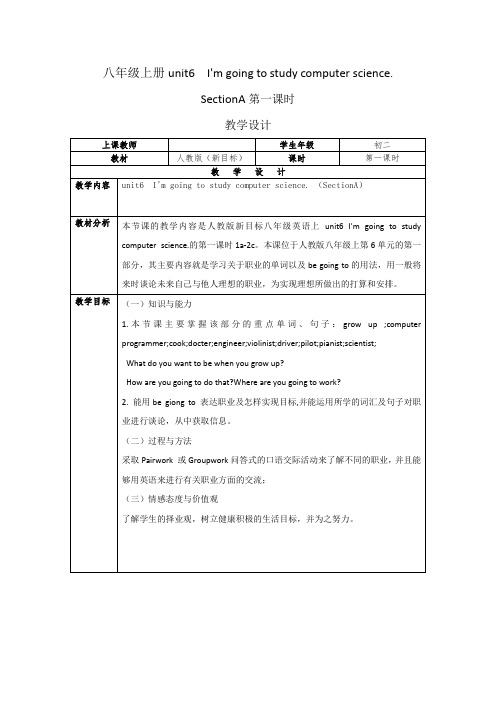
八年级上册unit6 I'm going to study computer science.SectionA第一课时教学设计学情分析初中学生的抽象思维能力比较低,形象思维能力强,但注意力容易分散。
我们可以拟以故事、小品、漫画或动画等形式展示,并配以丰富的色彩,从而增强学生的兴趣和注意力。
根据教育心理学,如果学生对于一件事物有极大的兴趣,他们就会排除主观和客观的种种消极因素,尽量全身心地投入到知识的学习中去。
初中生的学习心理特点:(1)兴趣:对英语普遍感兴趣,但有很大的不稳定性,好奇心强,求知欲旺盛,已不满足教师对课文的简单重复。
(2)记忆:对刺激记忆手段多的知识记忆深刻,遵从记忆规律。
(3)思维:偏重于形象思维,对片面,零碎的材料尚缺乏一定的概括分析能力。
(4)评价:主要通过他人评价初步形成对自己的评价,所以很在乎他人的评价;自我认识较模糊、片面,但自我意识却不断增强。
因此,在本学科的教学过程中,在注重启发引导,培养学生分析、概括能力的同时,更要注重教学方法的灵活性,通过任务型教学法,情景交际法,全身反应教学法等,激发学生学习的兴趣,让学生乐于接受,易于接受。
学生知识储备:初二上期的学生在初中经过一年的学习,有了一定的英语基础知识和听说能力,正逐渐向读、写过渡,同时,学生们对英语学习还保持着较浓厚的兴趣。
经过一年的新课程理念的熏陶及实践,有了初步的自主、与他人合作交流、实践的能力。
本课时是关于未来理想职业的,内容贴近生活,比较能引起学生的兴趣,学生比较容易进入角色。
学生上课的课堂气氛较活跃,中等学生占多数,但是学困生比例也比较多,两极分化比较严重,学生只能够进行简单的会话,在学习策略方面仍存在许多要解决的问题。
有些同学在学习中缺乏小组合作意识,并且不能够大胆的用英语交流。
效果分析本节课的主要内容是让学生们通过对话来练习bbe going to 的相关句型,并且能够用该句型来表达自己未来理想的职业和询问他人的理想职业。
人教版八上英语6单元第一课时教学设计

新目标英语八年级上Unit 6第一课时课堂教学设计Unit 6 I’m going to study computer science.Period 1(P41)一、教学设计说明在新课程理念下的英语课堂教学应是“以学生发展为中心,师生共同参与教学活动,全面构建以交流为主的新型师生关系,重视学生学习方式的转变,着重培养学生的创新精神和实践能力,实现个性化、多元化的课堂教学”。
基于这一理念,在课堂教学活动中充分遵循了“学生互动、师生互动”的原则,运用自主、合作、探究的学习方式,开展了学生们乐于参与的教学活动,如情景对话,现场采访等活动。
二、教学分析1、教学内容分析《Unit 6 I’m going to study computer science(一).》是义务教育教科书英语(新目标)Go for it八年级上第六单元中的第一课。
本课对培养学生的会话能力,激发学生的学习兴趣起着极其重要的作用。
2、学生分析本课的教学对象是八年级上学期的学生。
他们生动活泼、热情好动,尚处于英语学习的初步阶段,他们求知欲旺盛,但同时他们的注意力又容易分散。
因此在课堂教学中,教师要充分调动他们的积极性,激发他们的学习热情,使他们能很好地投入到课堂上来。
三、教学目标1.知识与技能目标:能正确使用computer programmer, cook , doctor , engineer, violinist, driver, pilot, pianist, scientist,grow up等词汇以及be going to 结构表示将来以及want to be 谈论未来的理想。
2.过程与方法目标:(1) 能综合运用看、听、说和讨论等有效手段来获取信息。
(2)能借小组活动的机会,积极用英语与其他同学交流,讨论未来的理想职业。
3.情感态度与价值观目标:能通过对未来话题的讨论,树立自己的生活目标。
四、教学重难点1、教学重点:computer programmer, cook , doctor , engineer, violinist, driver, pilot, pianist,scientist,grow up等词汇的含义和用法,be going to 结构表示将来以及want to be 谈论未来的理想。
人教八上英语 Unit 6 I'm more outgoing than my sister 教学设计
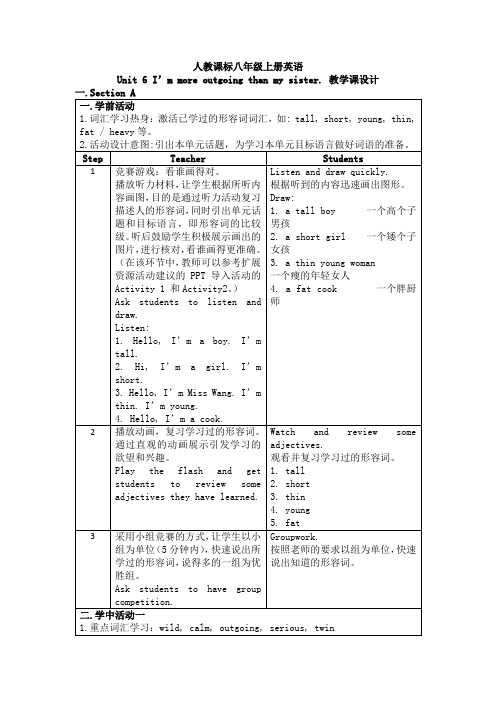
8
听第一遍将答案写在书上;听第二遍,利用PPT核对答案。
After the first listening, ask students to write the numbers next to the correct persons in the picture above. Ask students to listen again and check the answers.
5. fat
3
采用小组竞赛的方式,让学生以小组为单位(5分钟内),快速说出所学过的形容词,说得多的一组为优胜组。
Ask students to have group competition.
Groupwork.
按照老师的要求以组为单位,快速说出知道的形容词。
二.学中活动一
1.重点词汇学习:wild, calm, outgoing, serious, twin
Listen and number the pairs of twins (1-3) in the picture.
听录音,给图中的双胞胎标号。
Check the answers.
听,核对答案。
9
播放第三遍1b,让学生根据对话内容填词。
Play the tape and ask studentsto fill in the blanks.
Conversation 2
A: That’s Tara, isn’t it?
B: No, it isn’t. It’s Tina. Tina is ______ than Tara. And she’s also ______.
Conversation 3
A: Is that Paul?
中小学教师微课设计方案八上英语第六单元第一课时教案
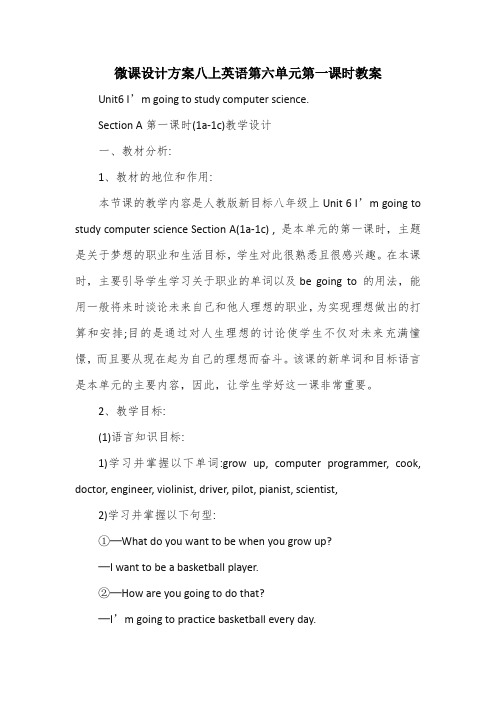
微课设计方案八上英语第六单元第一课时教案Unit6 I’m going to study computer science.Section A第一课时(1a-1c)教学设计一、教材分析:1、教材的地位和作用:本节课的教学内容是人教版新目标八年级上Unit 6 I’m going to study computer science Section A(1a-1c) , 是本单元的第一课时,主题是关于梦想的职业和生活目标,学生对此很熟悉且很感兴趣。
在本课时,主要引导学生学习关于职业的单词以及be going to 的用法,能用一般将来时谈论未来自己和他人理想的职业,为实现理想做出的打算和安排;目的是通过对人生理想的讨论使学生不仅对未来充满憧憬,而且要从现在起为自己的理想而奋斗。
该课的新单词和目标语言是本单元的主要内容,因此,让学生学好这一课非常重要。
2、教学目标:(1)语言知识目标:1)学习并掌握以下单词:grow up, computer programmer, cook, doctor, engineer, violinist, driver, pilot, pianist, scientist,2)学习并掌握以下句型:①─What do you want to be when you grow up?─I want to be a basketball player.②─How are you going to do that?─I’m going to practice basketball every day.3) 学习了解以下结构,并能用一般将来时态表达将要做的事情。
Be going to ,want to be.(2)能力目标:能用所学新单词、目标语言和be going to 句型谈论将来的打算。
(3)情感态度价值观目标:每个人都有自己的梦想和对未来的打算,对于将来想要从事的职业也充满了憧憬。
人教版八年级上册英语Unit 6 全单元.课程教学设计
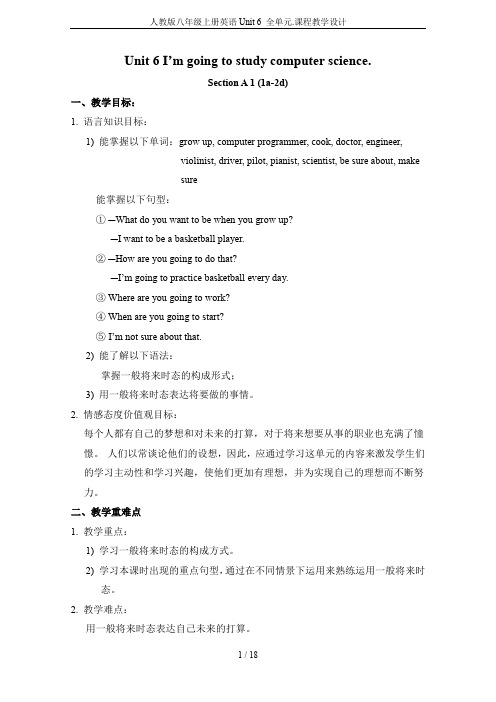
Unit 6 I’m going to study computer science.Section A 1 (1a-2d)一、教学目标:1. 语言知识目标:1) 能掌握以下单词:grow up, computer programmer, cook, doctor, engineer,violinist, driver, pilot, pianist, scientist, be sure about, makesure能掌握以下句型:①─What do you want to be when you grow up?─I want to be a basketball player.②─How are you going to do that?─I’m going to practice basketball every day.③ Where are you going to work?④ When are you going to start?⑤I’m not sure about that.2) 能了解以下语法:掌握一般将来时态的构成形式;3) 用一般将来时态表达将要做的事情。
2. 情感态度价值观目标:每个人都有自己的梦想和对未来的打算,对于将来想要从事的职业也充满了憧憬。
人们以常谈论他们的设想,因此,应通过学习这单元的内容来激发学生们的学习主动性和学习兴趣,使他们更加有理想,并为实现自己的理想而不断努力。
二、教学重难点1. 教学重点:1) 学习一般将来时态的构成方式。
2) 学习本课时出现的重点句型,通过在不同情景下运用来熟练运用一般将来时态。
2. 教学难点:用一般将来时态表达自己未来的打算。
三、教学过程Ⅰ. RevisionⅡ. Warming up1. 介绍自己小时候想要从事的职业,由此归纳出以前所学过的一些职业的英语表达方式:teacher, nurse, doctor, basketball player, runner, actor, actress…2. 询问学生们想要从事的职业,从而引出句型:─ What do you want to be when you grow up?─ I want to be a basketball player.3. 学生们看幻灯片,引导学生们进行问答自己将来所喜欢的职业。
Unit6大单元整体教学设计人教版英语八年级上册

4.正确引导学生树立积极健康的生活和学习目标,并为实现自己的理想而不断努力。
单元
重难点
1.重点:(1)掌握本单元的重点词汇、重点句型及语法:用be going to表示一般将来时。
(2)掌握一般将来时be going to中be的具体形式和后面接动词原形的用法。
3.激发学生学习的主动性和学习兴趣,使他们更加有理想,并为之不断努力。
1.重点:(1)一般将来时的运用。
(2)掌握并熟练运用询问和表达未来职业的句型。
2.难点:正确使用“be going to…”和“I want to be…”谈论未来职业以及如何实现梦想。
Period Ⅱ
Section A
(Grammar Focus
2.运用英语思维条理清晰地谈论个人的计划和打算,合理制定计划,并努力完成计划,增强目标意识。
4.思维上提升学生对未来的构想和合理规划,促进目标意识。
文化
意识
1.认识不同职业的区别,初步树立职业梦想,正确引导青少年的职业规划。
2.通过谈论新年规划和决心激发学生努力学习。
3.培养学生自己制订学习和生活计划,增强自律性。
2.激发学生们的学习主动性和学习兴趣,让他们思考自己的理想或目标,并为实现自己的理想而不断努力。
1.重点:(1)能综合运用所学的重难点词汇来完成相关任务。
(2)能灵活运用be going to结构表达将要发生的动作。
2.难点:能用英语根据相关提示来完成关于自己计划或决心的习作。
单元教学反思
1.注重因材施教,对基础不同的学生,在开始阶段应有不同层次的要求,多鼓励,少批评,甚至不批评,以充分调动每个学生学习英语的积极性。
【人教版】新目标八年级英语上册:Unit 6 单元教学设计

【人教版】新目标八年级英语上册:Unit 6 单元教学设计一. 教材分析人教版新目标八年级英语上册Unit 6主要围绕“野生动物”的主题展开,通过学习本单元,学生能够掌握关于野生动物的词汇和表达方式,提高运用英语进行交流的能力。
教材以真实情境的图片和生动的故事引起学生的兴趣,同时培养学生的环保意识。
本单元包括词汇、对话、阅读和写作等丰富多样的教学内容,为教学提供了广阔的空间。
二. 学情分析八年级的学生已经具备了一定的英语基础,能够运用简单的英语进行日常交流。
但是,学生在口语表达和写作方面还存在一定的困难,需要通过大量的练习来提高。
此外,学生对野生动物的了解相对有限,通过本单元的学习,可以拓宽他们的视野,增强环保意识。
三. 教学目标1.知识目标:学生能够掌握本单元的生词和短语,理解课文内容,掌握阅读技巧。
2.能力目标:学生能够运用所学知识进行口语交流和写作,提高英语应用能力。
3.情感目标:学生能够增强对野生动物的关爱,提高环保意识。
四. 教学重难点1.重点:本单元的生词和短语,以及课文内容的理解。
2.难点:学生在实际情境中运用所学知识进行口语交流和写作。
五. 教学方法采用任务型教学法,通过设定各种真实的任务,引导学生参与课堂活动,提高学生的英语应用能力。
同时,运用小组合作学习法,培养学生的团队合作精神,激发学生的学习兴趣。
六. 教学准备1.教师准备:提前熟悉教材内容,设计教学活动,准备教学素材。
2.学生准备:预习教材,了解本单元主题。
七. 教学过程1.导入(5分钟)利用图片或视频展示一些野生动物,引导学生谈论他们所知道的野生动物,激发学生的兴趣。
2.呈现(10分钟)教师通过PPT展示本单元的生词和短语,让学生朗读并理解其含义。
然后,教师呈现课文内容,引导学生跟读并理解课文大意。
3.操练(15分钟)教师设计各种情景,让学生运用所学知识进行口语交流。
如:模拟在动物园的对话、讨论保护野生动物的方法等。
4.巩固(10分钟)教师给出一些关于野生动物的图片,让学生用英语描述它们。
人教新目标英语八年级上册Unit6全单元教学设计
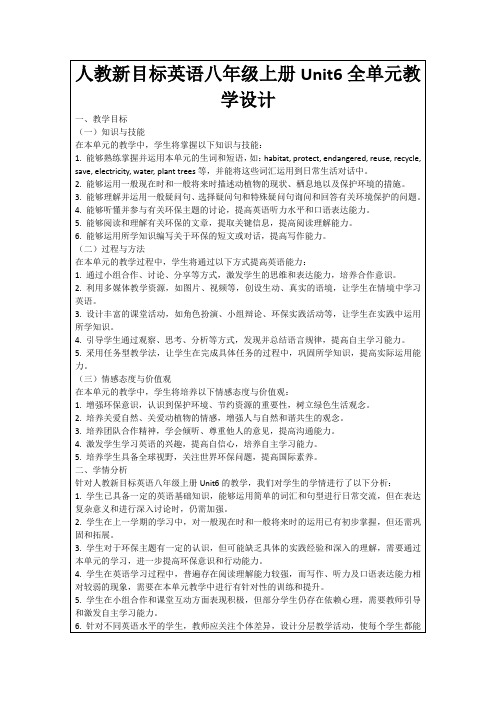
2.学生在上一学期的学习中,对一般现在时和一般将来时的运用已有初步掌握,但还需巩固和拓展。
3.学生对于环保主题有一定的认识,但可能缺乏具体的实践经验和深入的理解,需要通过本单元的学习,进一步提高环保意识和行动能力。
4.引导学生通过观察、思考、分析等方式,发现并总结语言规律,提高自主学习能力。
5.采用任务型教学法,让学生在完成具体任务的过程中,巩固所学知识,提高实际运用能力。
(三)情感态度与价值观
在本单元的教学中,学生将培养以下情感态度与价值观:
1.增强环保意识,认识到保护环境、节约资源的重要性,树立绿色生活观念。
2.教学方法:采用图片、实物展示,结合例句,让学生在实际语境中理解和运用所学知识。
3.设计意图:帮助学生掌握环保主题的相关词汇和句型,为后续的讨论和表达打下基础。
(三)学生小组讨论
1.教学内容:针对环保主题,引导学生讨论以下问题:“What are the main environmental problems in our country?”、“How can we protect the endangered animals?”、“What can we do to save energy and reduce pollution?”等。
2.词汇教学:通过图片、实物展示等方式,帮助学生直观地理解和记忆环保词汇,同时结合例句,让学生在实际语境中运用。
3.句型练习:设计角色扮演、小组讨论等活动,让学生在实际对话中练习一般现在时和一般将来时的句型,提高口语表达能力。
4.听力训练:播放与环保相关的听力材料,引导学生进行信息提取和总结,提高听力水平。
人教新目标版八上英语Unit 6 第1课时(Section A 1a-2d)教学课件

12 is least interesting).
___ computer programmer
___ cook
___ doctor ___ engineer
___ teacher
___ violinist ___ bus driver ___ pilot
Girl: And how are you going to become a teacher?
Cheng Han: Well, I’m going to learn how to teach children.
Girl: When are you going to start?
Cheng Han: I’m going to finish high school and college first.
What He wants to be a teacher. Where He is going to move to Shanghai.
How He is going to learn how to teach children. When He is going to finish high school and college first.
A: What are you going to be when you grow up?
B: I’m going to be an astronaut.
A: How are you going to do that?
B: I’m going to study hard and take exercises every day.
…
Answer the questions.
人教版八年级上册英语Unit 6 全单元.教学设计

Unit 6 I’m going to study computer science.Section A 1 (1a-2d)一、教学目标:1. 语言知识目标:1) 能掌握以下单词:grow up, computer programmer, cook, doctor, engineer,violinist, driver, pilot, pianist, scientist, be sure about, makesure能掌握以下句型:①─What do you want to be when you grow up?─I want to be a basketball player.②─How are you going to do that?─I’m going to practice basketball every day.③ Where are you going to work?④ When are you going to start?⑤I’m not sure about that.2) 能了解以下语法:掌握一般将来时态的构成形式;3) 用一般将来时态表达将要做的事情。
2. 情感态度价值观目标:每个人都有自己的梦想和对未来的打算,对于将来想要从事的职业也充满了憧憬。
人们以常谈论他们的设想,因此,应通过学习这单元的内容来激发学生们的学习主动性和学习兴趣,使他们更加有理想,并为实现自己的理想而不断努力。
二、教学重难点1. 教学重点:1) 学习一般将来时态的构成方式。
2) 学习本课时出现的重点句型,通过在不同情景下运用来熟练运用一般将来时态。
2. 教学难点:用一般将来时态表达自己未来的打算。
三、教学过程Ⅰ. RevisionⅡ. Warming up1. 介绍自己小时候想要从事的职业,由此归纳出以前所学过的一些职业的英语表达方式:teacher, nurse, doctor, basketball player, runner, actor, actress…2. 询问学生们想要从事的职业,从而引出句型:─ What do you want to be when you grow up?─ I want to be a basketball player.3. 学生们看幻灯片,引导学生们进行问答自己将来所喜欢的职业。
【人教版】新目标八年级英语上册:Unit6单元说课稿

【人教版】新目标八年级英语上册:Unit6单元说课稿一. 教材分析人教版新目标八年级英语上册Unit6主要围绕着“节日”这一主题展开,通过学习本单元,学生能够掌握关于节日的词汇和表达方式,了解不同国家的节日习俗,提高自己的跨文化交际能力。
教材内容丰富,包括主课文、语法、听说、读写等多个部分,旨在全面提升学生的英语综合运用能力。
二. 学情分析八年级的学生已经具备了一定的英语基础,对于学习新的词汇和表达方式有一定的掌握。
但同时,学生在语法、听说、读写等方面的能力参差不齐,需要针对性地进行教学设计。
此外,学生对于不同国家的文化背景了解有限,需要通过课堂拓展来提高他们的跨文化交际意识。
三. 说教学目标1.知识目标:学生能够掌握关于节日的词汇和表达方式,了解不同国家的节日习俗。
2.能力目标:学生能够运用所学知识进行简单的跨文化交际,提高自己的英语口语表达能力。
3.情感目标:培养学生对不同文化的尊重和理解,拓宽国际视野。
四. 说教学重难点1.重点:掌握关于节日的词汇和表达方式,了解不同国家的节日习俗。
2.难点:运用所学知识进行实际的跨文化交际,提高英语口语表达能力。
五. 说教学方法与手段1.交际法:通过模拟真实场景,让学生在实际语境中运用所学知识进行交流。
2.任务型教学法:通过完成各种任务,激发学生的学习兴趣,提高他们的实践能力。
3.多媒体教学手段:运用PPT、视频等教学辅助材料,丰富课堂形式,提高学生的学习积极性。
六. 说教学过程1.导入:以一段关于节日的视频导入,激发学生的学习兴趣,同时引导学生思考:你们知道哪些节日?最喜欢哪个节日?2.新课呈现:通过PPT展示本节课的主要内容,包括节日词汇和表达方式,不同国家的节日习俗等。
3.课堂实践:模拟真实场景,让学生分组进行角色扮演,运用所学知识进行跨文化交际。
4.语法讲解:针对本节课的语法点,进行详细的讲解和示例,让学生在理解的基础上进行运用。
5.听力训练:播放一段关于节日的听力材料,学生听后进行问答,检查学生对听力材料的理解程度。
人教版八年级英语上册第六单元教学设计(教案)

Unit 6 I’m going to study computer science.Step Ⅰ. Warming- up and revision1. Have a dictation of the new words and expressions.2. Review the phrases. And make a sentence with it.1) 成长 ___________ 2) 写下;记录下___________3) 听起来像 ___________ 4)同意___________5) 确定,确保 _________ 6)新年的决心 _____________Step Ⅱ. Discussing1.Imagine you work for your city. Think of a plan to make it clear and greener.2. Give Ss some examples:We’re going to make the subway better. Then people don’t haveto drive to work.We’re going to plant more trees and flowers in the park andstreet.3. Ss try to write about their own plans on a piece of paper.4. Let some Ss read out their plans. See who has a best one. Step Ⅲ. Self checkWork on Self check 1:1. Match the jobs with the school subjects.2. Check the answers. Then let some Ss make some sentences with them. e.g.I want to be a computer programmer. I’m going to study computer science.Work on Self check 21. Tell Ss to read the conversation and fill in the blanks with the right words.2. Ss work by themselves.3. Check the answers and explain.Work on Self check 31. Tell Ss to make their own plans using the phrases below.2. Ss work with their partners. Write down their own plans.3. Let some Ss read their plans. Correct any mistakes.Step ⅣHomework :1. Review Section B.2.根据句意及首字母提示,完成下列单词的拼写1).It is wellknown that Li Yundi is a p______.2).I’m going to a c after I leave the high school.3).The students are d______ the weekly plan.4).We must take our s______ seriously.5).Don’t open that box. It’s my (个人的) thing.6).Li Lei likes delicious food and he wants to be a c .7).He joined the English club to (提高) his English.8). Mary is writing an a for a magazine.9). He cares more about his p health. He exercises everymorning.10). There are some f_________ friends visiting our school.3..句型转换1). He is going to go to a cooking school. (对划线部分提问)is he going to ?2).My father wants to be a pilot. (写出一般疑问句)your father to be a pilot?3).It’s a good time to make resolutions at the beginning of theyear.(写出同义句)The of the year is a good time for resolutions.4).Will you make a model plane for her? (写出同义句)you to make a model plane for her?5).The resolution is s o hard that he can’t keep it. (写出同义句)The resolution is hard for him keep.4.根据汉语提示完成句子1).你长大后想当什么?What do you want to be when you ______ ______?2).李伟昨天制定了他的新年计划。
最新人教新目标英语八年级上册 Unit 6 I'm going to study computer science Section A(1a-1c)教学设计

Unit 6 I’m going to study computer science.Section A(1a—1c)教学内容本课是人教版八年级上册第六单元内容。
本单元的中心话题是“生活目标”,整个单元的内容是围绕“future intentions”这个话题展开的。
本节课讲授Section A第一课时内容,课型是一节听说课。
本节课以提高学生的听力技巧和语言表达能力为目标,锻炼学生们综合运用语言的能力。
教学目标(一)能力目标:在本节课结束时,学生能够:1.能够简单谈论对未来的打算;2.能够正确使用be going to 结构表示将来;3.能够正确使用want to be谈论未来的理想。
(二)目标语言:重点词汇和短语cook, doctor, engineer, violinist, driver, pilot, pianist, scientist,computer programmer, grow up重点句型结构A: What do you want to be when you grow up?B: I want to be a/an...A: How are you going to do that?B: I’m going to...(三) 情感态度价值观目标:通过学习这单元的内容来激发学生们的学习主动性和学习兴趣,使他们更加有理想,并为实现自己的理想而不断努力。
教学重难点教学重点:能够运用be going to, want to be 结构,谈论理想的内容和实现理想的举措是本节课的教学重点。
教学难点:学生对未来理想的憧憬多种多样,表达时会受到词汇的限制,教师应帮助学生能够正确运用相关职业的词汇来谈论自己的理想职业。
教学方法媒体辅助法﹑情境教学法﹑视听教学法,小组合作及个人表达相结合。
教学步骤Step 1.Greeting.Step 2.Show learning aims.Step 3. Lead inTeacher says:“ I’m happy every day, because I have a happy family. Are you inte rested in my family?”Teacher shows two pictures of her family to lead in job words .【设计意图】:联系实际生活创设真实语境,学生对自己老师的家庭成员很感兴趣,通过介绍老师家庭成员的职业,进一步询问班内几名学生家人的职业导入新课,学习新词汇。
八年级英语上Unit_6_Section_A_1a_1c教学设计(杨洪国)

八年级英语上Unit 6 I’m more outgoing than my sister.Section A 1a—1c教学设计进贤县罗溪中学杨洪国一、教材分析Analysis of Teaching Material1、教学内容:本节讲授内容为八年级第六单元第一课时。
本单元围绕做“比较级” 这个句型开展多种教学活动,本节课是本单元的重点,主要通过学习形容词的比较等级,对人的外貌和性格特征进行对比,进一步加深对比较等级的语法现象的理解和运用。
同时通过对话对比较等级进行操练,进一步提高学生听、说、读、写综合素质能力。
本课为Unit 6的第一课,本单元主要学习如何运用描述人的外表及性格的形容词,引出本单元的语法项目:①形容词的比较级;②含比较级的句型。
2、教材地位和作用:以描述人的外貌和性格特征的形容词为主线,兼顾交际功能的学习,以一种循序渐进的生活化的学习程序,引导学生学会用英语对自己或他人的外表和性格特征进行对比,注重语言知识的呈现,为以后作可持续交际奠定基础。
二、教学目标Teaching Goals1. 知识目标:(1)学习、掌握tall, short, smart, long, wild, quiet, funny, heavy, outgoing的比较级;初步掌握规则单音节词及少数双音节词、多音节词比较级的构成形式。
(2)能熟练运用-Is that …?-- No, it isn’t . It’s …. It’s …. …is …than ….句型对人的外貌及性格特征作对比。
Pedro is funnier than Paul.Tina is taller than Tara.Tom is more athletic than Sam.2. 能力目标:提高学生听、说、读、写及知识自学的综合能力。
3. 情感目标:(1)通过形象、生动的教学使学生掌握如何去比较两个人,并从中学会欣赏别人,享受与不同的人交往的乐趣。
人教版新目标英语八年级上册Unit6 I’m going to study computer science Section B(1a-1e)优秀教学设计

新目标英语八年级上册Unit 6 I’m going to study computer scienceSection B (1a—1e) 教学设计一、教材分析:1. 单元分析及教材处理:本单元通过学习与职业有关的词汇,谈论自己将来的理想,以及为实现自己的理想打算怎样做。
本单元要学习的语法知识是一般将来时的be going to 结构。
Section B 围绕“新年计划”( New Year’s resolution )话题展开,语言输入量多。
它是学生对Section A 中所学知识的巩固、拓展与提升运用。
1a-1b 通过图文匹配和对话练习帮助学生复习讨论自己将来的打算。
1a中出现的短语是Section A 中未出现过的,它们为后面1a – 1d 的听力材料的呈现提供了词汇储备。
1c-1d 以“谈论新年计划”为话题展开听力练习,自然贴切地运用了1a中刚学的词组,能让学生进一步体会目标语言在真实语境中的运用。
1e 是一个两人问答活动,学生可以自行组织对话,灵活度较大。
但学生谈论的焦点必须是将来理想的职业和实现理想所采取的措施。
这个活动也可以用来培养学生从听力材料中提取单元目标语言或重要信息的能力。
学习进度稍慢的学生可以让他们借助1a 中的内容自编对话操练。
2.教学目标:Teaching aims(1.)知识目标 :a. words and expressions: resolution, team, foreign , next year, take guitar lessons,learn to do sth , make soccer team, eat healthier food, get good grades, take lots of exerciseb. goal languages : What are you going to do next year?I’m going to study hard and get good grades.How are you going to do that?(2.)技能目标: 学会运用将来时的be going to 结构(3.)情感态度与价值观: 每个人都有自己的梦想和对未来的打算,对于将来想要从事的职业也充满了憧憬。
八年级英语上册-人教版-Unit 6 教学设计
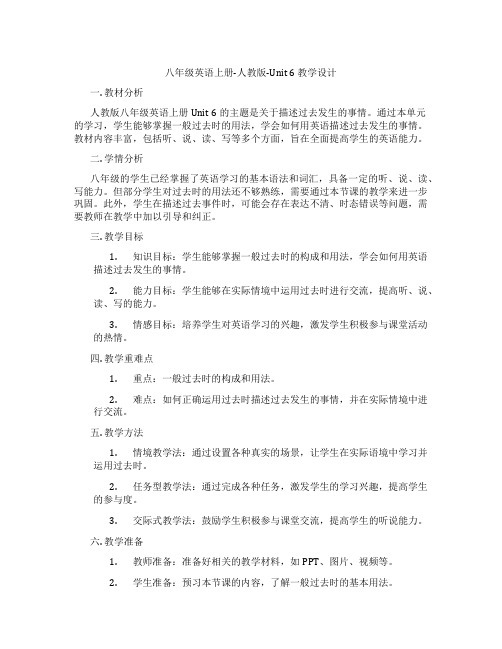
八年级英语上册-人教版-Unit 6 教学设计一. 教材分析人教版八年级英语上册Unit 6的主题是关于描述过去发生的事情。
通过本单元的学习,学生能够掌握一般过去时的用法,学会如何用英语描述过去发生的事情。
教材内容丰富,包括听、说、读、写等多个方面,旨在全面提高学生的英语能力。
二. 学情分析八年级的学生已经掌握了英语学习的基本语法和词汇,具备一定的听、说、读、写能力。
但部分学生对过去时的用法还不够熟练,需要通过本节课的教学来进一步巩固。
此外,学生在描述过去事件时,可能会存在表达不清、时态错误等问题,需要教师在教学中加以引导和纠正。
三. 教学目标1.知识目标:学生能够掌握一般过去时的构成和用法,学会如何用英语描述过去发生的事情。
2.能力目标:学生能够在实际情境中运用过去时进行交流,提高听、说、读、写的能力。
3.情感目标:培养学生对英语学习的兴趣,激发学生积极参与课堂活动的热情。
四. 教学重难点1.重点:一般过去时的构成和用法。
2.难点:如何正确运用过去时描述过去发生的事情,并在实际情境中进行交流。
五. 教学方法1.情境教学法:通过设置各种真实的场景,让学生在实际语境中学习并运用过去时。
2.任务型教学法:通过完成各种任务,激发学生的学习兴趣,提高学生的参与度。
3.交际式教学法:鼓励学生积极参与课堂交流,提高学生的听说能力。
六. 教学准备1.教师准备:准备好相关的教学材料,如PPT、图片、视频等。
2.学生准备:预习本节课的内容,了解一般过去时的基本用法。
七. 教学过程1.导入(5分钟)教师通过提问引导学生回顾过去时的一般疑问句和回答方式,激发学生的学习兴趣。
2.呈现(10分钟)教师展示PPT,呈现本节课的主要内容,包括一般过去时的构成、用法以及相关词汇。
同时,教师可以通过图片、视频等材料,为学生提供直观的感官体验,帮助学生更好地理解和记忆。
3.操练(10分钟)教师学生进行小组活动,让学生用过去时描述发生在小组成员之间的故事。
人教版八年级上英语Unit6同步全单元教案
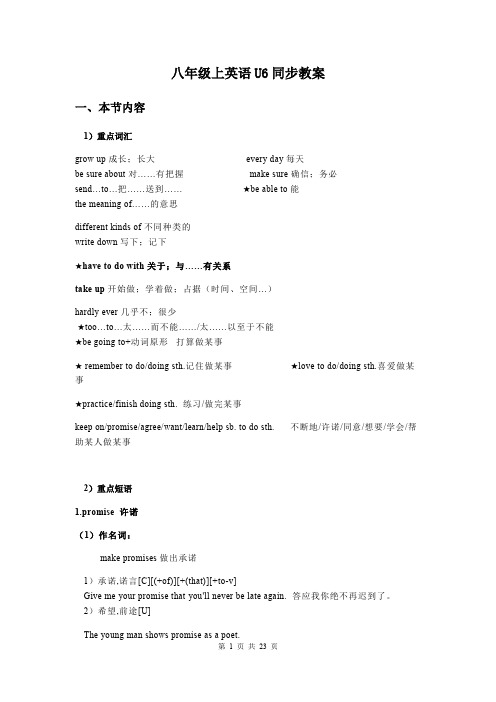
八年级上英语U6同步教案一、本节内容1)重点词汇grow up成长;长大every day每天be sure about对……有把握make sure确信;务必send…to…把……送到……★be able to能the meaning of……的意思different kinds of不同种类的write down写下;记下★have to do with关于;与……有关系take up开始做;学着做;占据(时间、空间…)hardly ever几乎不;很少★too…to…太……而不能……/太……以至于不能★be going to+动词原形打算做某事★ remember to do/doing sth.记住做某事★love to do/doing sth.喜爱做某事★practice/finish doing sth. 练习/做完某事keep on/promise/agree/want/learn/help sb. to do sth. 不断地/许诺/同意/想要/学会/帮助某人做某事2)重点短语1.promise 许诺(1)作名词:make promises做出承诺1)承诺,诺言[C][(+of)][+(that)][+to-v]Give me your promise that you'll never be late again. 答应我你绝不再迟到了。
2)希望,前途[U]The young man shows promise as a poet.这位青年有成为诗人的希望。
(2)作动词1)允诺,答应+sth.\to doHe promised me the book. 他答应给我这本书。
He promised (help)us. 他答应要帮助我们。
I can't give you the book; I've promised it to Susan. 我不能把这本书给你;我已经答应给苏珊了。
- 1、下载文档前请自行甄别文档内容的完整性,平台不提供额外的编辑、内容补充、找答案等附加服务。
- 2、"仅部分预览"的文档,不可在线预览部分如存在完整性等问题,可反馈申请退款(可完整预览的文档不适用该条件!)。
- 3、如文档侵犯您的权益,请联系客服反馈,我们会尽快为您处理(人工客服工作时间:9:00-18:30)。
新目标英语八年级上Unit 6第一课时课堂教学设计Unit 6 I’m going to study computer science.Period 1(P41)长春市第153中学马玉成一、教学设计说明在新课程理念下的英语课堂教学应是“以学生发展为中心,师生共同参与教学活动,全面构建以交流为主的新型师生关系,重视学生学习方式的转变,着重培养学生的创新精神和实践能力,实现个性化、多元化的课堂教学”。
基于这一理念,在课堂教学活动中充分遵循了“学生互动、师生互动”的原则,运用自主、合作、探究的学习方式,开展了学生们乐于参与的教学活动,如情景对话,现场采访等活动。
二、教学分析1、教学内容分析《Unit 6 I’m going to study computer science(一).》是义务教育教科书英语(新目标)Go for it八年级上第六单元中的第一课。
本课对培养学生的会话能力,激发学生的学习兴趣起着极其重要的作用。
2、学生分析本课的教学对象是八年级上学期的学生。
他们生动活泼、热情好动,尚处于英语学习的初步阶段,他们求知欲旺盛,但同时他们的注意力又容易分散。
因此在课堂教学中,教师要充分调动他们的积极性,激发他们的学习热情,使他们能很好地投入到课堂上来。
三、教学目标1.知识与技能目标:能正确使用computer programmer, cook , doctor , engineer, violinist, driver, pilot, pianist, scientist,grow up等词汇以及be going to 结构表示将来以及want to be 谈论未来的理想。
2.过程与方法目标:(1) 能综合运用看、听、说和讨论等有效手段来获取信息。
(2)能借小组活动的机会,积极用英语与其他同学交流,讨论未来的理想职业。
3.情感态度与价值观目标:能通过对未来话题的讨论,树立自己的生活目标。
四、教学重难点1、教学重点:computer programmer, cook , doctor , engineer, violinist, driver, pilot, pianist, scientist,grow up等词汇的含义和用法,be going to 结构表示将来以及want to be 谈论未来的理想。
2、教学难点:用be going to 结构表示将来以及want to be 谈论未来的理想。
五、教学媒体的运用录音机及多媒体辅助教学六、教学过程设计Step 1: Lead inT: Good morning, everyone !Ss: Good morning, Mr. Ma!T: Sit down , please .Ss: Thank you, Mr. Ma .T: Before class , I hear every student has a dream .Yes ?Ss: Yes .T: Good . Do you want to share your dreams with us ?Ss: Of course .T: OK. Today let’s talk about our dreams together, that is Unit 6 I’m going to study computer science . ( The teacher writes the title “Unit 6 I’m going to study computer science.”On the blackboard. Students read after the teacher twice .Then students read it twice together . And the teacher asks a student to translate the title into Chinese .)Step 2: Fine design planThe teacher divides the students into four groups and shows the design plan of this lesson to the students and tell the students to know the details of this lesson and some exercises in class .T: Before new class , as usual , I will divide you into four big groups . In each big group there are two small groups . In each small group, if No.1 student can answer the question, and the team will get one mark , if No.3 student can answer the same question, the team will get three marks .The captain of the team will organize your members to talk about and try to answer my questions . Let’s see which team is the winner . Are you confident of yourselves ?Ss: Yes .T: Very good. Now I’ll show you the design plan of this lesson and we will know the important and difficult language points in this class and some exercises we will do in this lesson.( The teacher explains the important and difficult points to the students briefly .)Step 3: Vocabulary teachingUse six pictures on the video to teach the new words: professional basketball player, engineer, computer programmer, actor, pilot, violinist, pianist ,cook, doctor .T: Let’s check and share the jobs we have known . Can you say some occupational words and say out their meanings ?S1: teacher (老师) . S2: doctor(医生) . S3: cook (厨师) . S4: actor (演员) . S5: worker (工人) .…….T: Excellent. Now let’s see the pictures and try to guess the jobs of these people .( Ss learn some occupational words according to some pictures on the slides )T: What does the person do ? Can you guess ?S1: Bus driver .T: Can you spell it ?S1: B-U-S D-R-I-V-E-R .T: Do you want to be a driver ?S1: Yes .T: What do you think of the job ?S1: I think it’s very interesting and exciting .T: Hope your dream can come true one day . But there is a lot of traffic in the street, and you should drive carefully and keep safe . We should obey the traffic rules and don’t run the traffic lights .S1: Thank you Mr. Ma . I will .T: Let’s come to next picture ,what does the person do ?S2: Pilot . ( violinist , computer programmer ,doctor ,engineer ,pianist ,scientist )T: …….T: Next , let’s check your memories .Try to match these English words with their Chinese meanings .( First ,students do them one by one ,then do them together and try to spell these words together .)Step 4: Independent researchIn this part , students discuss these occupational words in groups .T: Now , let’s talk about these occupational words in groups . For example : What do you think of these jobs ? I think…is interesting/relaxing/exciting, but I think…is very boring / busy / dangerous / tiring . ( Two minutes )Group1: S1: I think the job pilot is very interesting and exciting, so I want to be a pilot in the future . S2: I think the job bus driver is very dangerous and busy , so I want to be a doctor in the futureGroup2: S1: I think the job bus driver is very dangerous and busy , so I want to be a cook in the future.T: Liu Ming , do you want to be a cook ?L: No, I think cook is very boring , I want to be a teacher, the teacher is very great.T: The job cook is boring, and the teacher is great. Other students, what do you want to be when you grow up ? (The teacher writes this sentence on the blackboard .)T: Please read this sentence after me .Ss: What do you want to be when you grow up ?T: Once again .Ss: What do you want to be when you grow up ?T: Here, grow up means …?Ss: 长大,成长T: want to be means … ?Ss: 想成为T:Then the whole sentence means … ?Ss: 当你长大的时候你想干什么?T: Who can translate this sentence into English ?S1: What do you want to be when you grow up ?S2: What do you want to be when you grow up ?S3: What do you want to be when you grow up ?T: What do you want to be when you grow up ? Who can tell me ?S1: I want to be a teacher .S2: I want to be a/an …(The teacher writes this sentence I want to be a/an…on the blackboard . and then writes this sentence I’m going to be a / an … by leading students to answer .Then the teacher explains I’m going to be a/an …by some sentences and practice it .)Step 6: Independent researchIn this part , students discuss these occupational words by a dialogue in groups .T: Now , let’s talk about these occupational words by this dialogue in groups . For example :---What do you want to be when you grow up? ---I’m going to be a/an … .I’ll give you two minutes . ( Students start to discuss this dialogue and some occupational words in groups .) T: Stop . OK .Which group is ready ?Group1: To show dialogues in pairs .Group2: To show dialogues in groups .Group3: …… Group4: …… Group5: …… Group6: …… Group7: …… Group8: ……Step 7: Results showT: Since you want to be a basketball player , then how are you going to do that ? (The teacher writes this sentence How are you going to do that ? on the blackboard and explains .你打算怎么做?)T: Since you want to be a basketball player , then how are you going to do that ?S1: I’m going to practice basketball every day .T: What about you, Zhang li ?Zhang: I’m going to be a teacher , I’m going to study hard from now .T: How about others ?Li :I’m going to … .Zhao: I’m going to … .Step 8: Independent researchT: Since someone wants to be a teacher, and someone wants to be a pilot . Then how are you going to do that ? What are you going to do to achieve your dreams ? Next, let’s talk about it in groups like this : -- What do you want to be when you grow up ? --- I’m going to be a/an … .--- How are you going to do that ? --- I’m going to … . According to some occupational words we have known . I’ll give you two minutes . ( Students start to talk about it in groups.) Then studentsshow their dialogues in groups .Step 9: Application sharing1.Listening practiceT: Since you want to be a teacher, and he wants to be a pilot . Then what are others going tobe ? How are they going to do that ? What are they going to do to achieve their dreams ? Next please open your books and turn to Page 41 , let’s see 1b .You will hear four dialogues , listen and fill in the blanks . Then match the items . Is it clear for you ?Ss: Yes .T: OK. Please listen to the tape . (Students start to listen and the teacher observes the students’listening habits . )T: OK. Let’s check your answers .(Ask the students to say out the answers and read.)T: Please put up your hands if your answers are right . Very good .Now, turn to Page100 and read and recite the tapescripts .2. Make a surveyT: Now let’s make a survey about our dreams .You can interview any student in our class orin your group ,then try to write a report like this :In our group ,Li Lei is going to be an actor , because he thinks it’s very exciting .He is goingto take acting lessons every day and he is going to work in Beijing when he grows up .3. Be going to的含义及用法T: Now , we have learned “Be going to” so far, do you know the meanings and usages of “Be going to” ?S1:be going to + v(原形) 表示“将要发生的动作或安排,或计划、打算、决定要做的事”,属一般将来时态。
